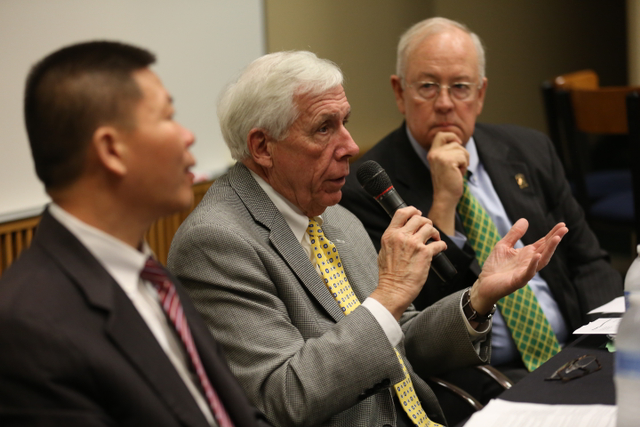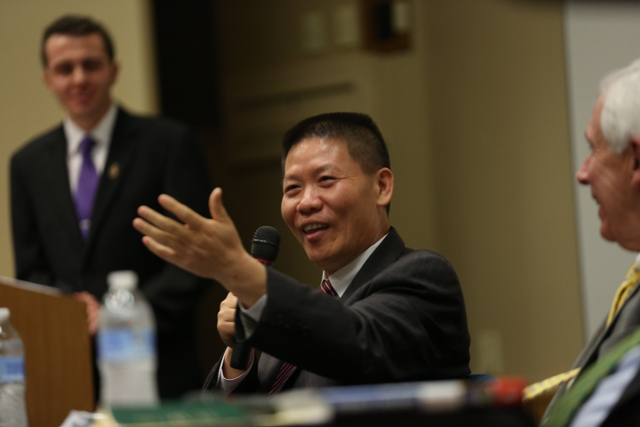By Ken Camp
Repressive governments, radical Islamists and reluctance by Western leaders to confront human rights abuses combine to create the worst global climate for religious liberty in recent history, say a university president with expertise in constitutional law, a victim of religious persecution in China and a former Congressman.
“Freedom is on decline in the world,” Baylor University President Ken Starr told participants at the Global Religious Freedom Summit on the Baylor campus in Waco, Texas, March 19.
Starr joined Bob Fu, founding president of the China Aid Association, and Frank Wolf, a 17-term Congressman from Virginia and sponsor of the International Religious Freedom Act of 1998, in a panel discussion at the event. It was organized by the Baylor chapter of the China Aid Association.
“Free exercise of religion means much more than freedom of worship,” Starr said, citing both the First Amendment to the U.S. Constitution and Article 18 of the Universal Declaration of Human Rights.
Starr criticized the “minimalist” position that sees religious liberty only as protecting freedom to worship. Such an approach is “a modern-day heresy” that seeks to keep people of faith from bringing their beliefs into the marketplace of ideas, he added.

Wolf agreed that religious liberty cannot be confined to what happens within the walls of a house of worship. He cited the impact of faith-based convictions on public policy, from William Wilberforce’s 40-year campaign to abolish the British slave trade to Martin Luther King Jr.’s leadership in the civil rights movement.
China officially recognizes “freedom of belief,” Fu observed, “but not freedom to practice that belief — certainly not in the public square.”
Fu — who participated as a student in the Tiananmen Square demonstrations in 1989 — led a house church in Beijing until he and his wife, Heidi, were imprisoned for two months for “illegal evangelism” in 1996.
China situation worst since Cultural Revolution
“It’s becoming worse and worse” for people of faith in China — not only Christians who worship in house churches that are not recognized by the government, but also in officially sanctioned churches, Fu said. “It’s the worst it’s been since the Cultural Revolution.”
Anyone who speaks up for human rights in China risks arrest, he added, noting that China detained 955 dissidents last year. That’s about as many as the previous two years combined, he said.

The panelists said the rise of the self-identified Islamic State and continued repression in Iran, Iraq and North Korea are major threats to global religious freedom.
“Radical Islam is about establishing a theocracy,” Starr said, emphasizing the importance of understanding the distorted version of Islamic theology that drives jihadists.
“ISIS is using the tools of modernity to achieve the goals of its deeply held religious beliefs,” he said.
Christians are not the only people of faith who suffer religious persecution, said Wolf, who was recently named the Jerry and Susie Wilson Chair in Religious Freedom at Baylor.
Other religions also suffer
Followers of the Baha’i faith have been persecuted in Iran, and victims of persecution in Iraq not only include Christians, but also Yazidis, Turkmen and other religious minorities, he said.
The Jewish population of Iraq has decreased from tens of thousands to single digits in less than 70 years, and a rising tide of anti-Semitism is evident in France and other European nations, he added.
Although North Korea consistently has been named among the top three offenders internationally in terms of human rights violations, recent U.S. administrations — both Democratic and Republican — have focused only on nuclear issues and failed to speak up for human rights, Wolf said.
“Part of the problem is the United States is not providing the leadership it used to,” he said, noting that during the Jimmy Carter and Ronald Reagan administrations, government representatives did not hesitate to speak out against international human rights violations.
Less powerful voices in the West
“It’s worse than ever before in part because there are less powerful voices in the West than there used to be,” he said.
The United States should recognize its strategic interest in advancing religious liberty around the world, because its absence presents a “clear and present danger” to international stability, Starr said.
“International religious freedom is a matter of American national security and global peace,” he said.
